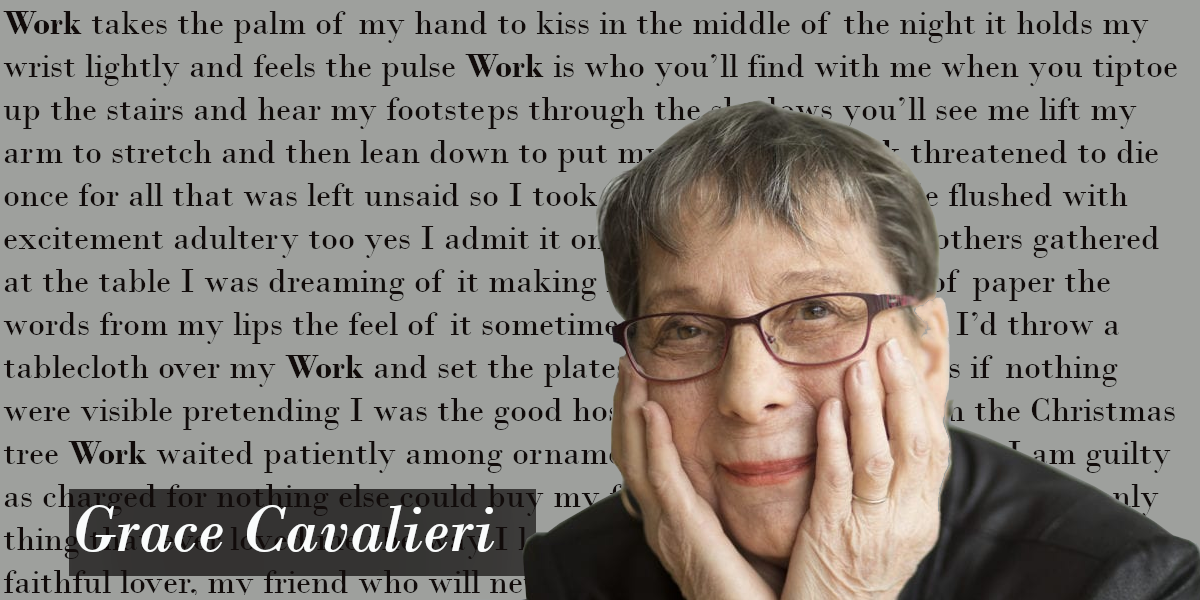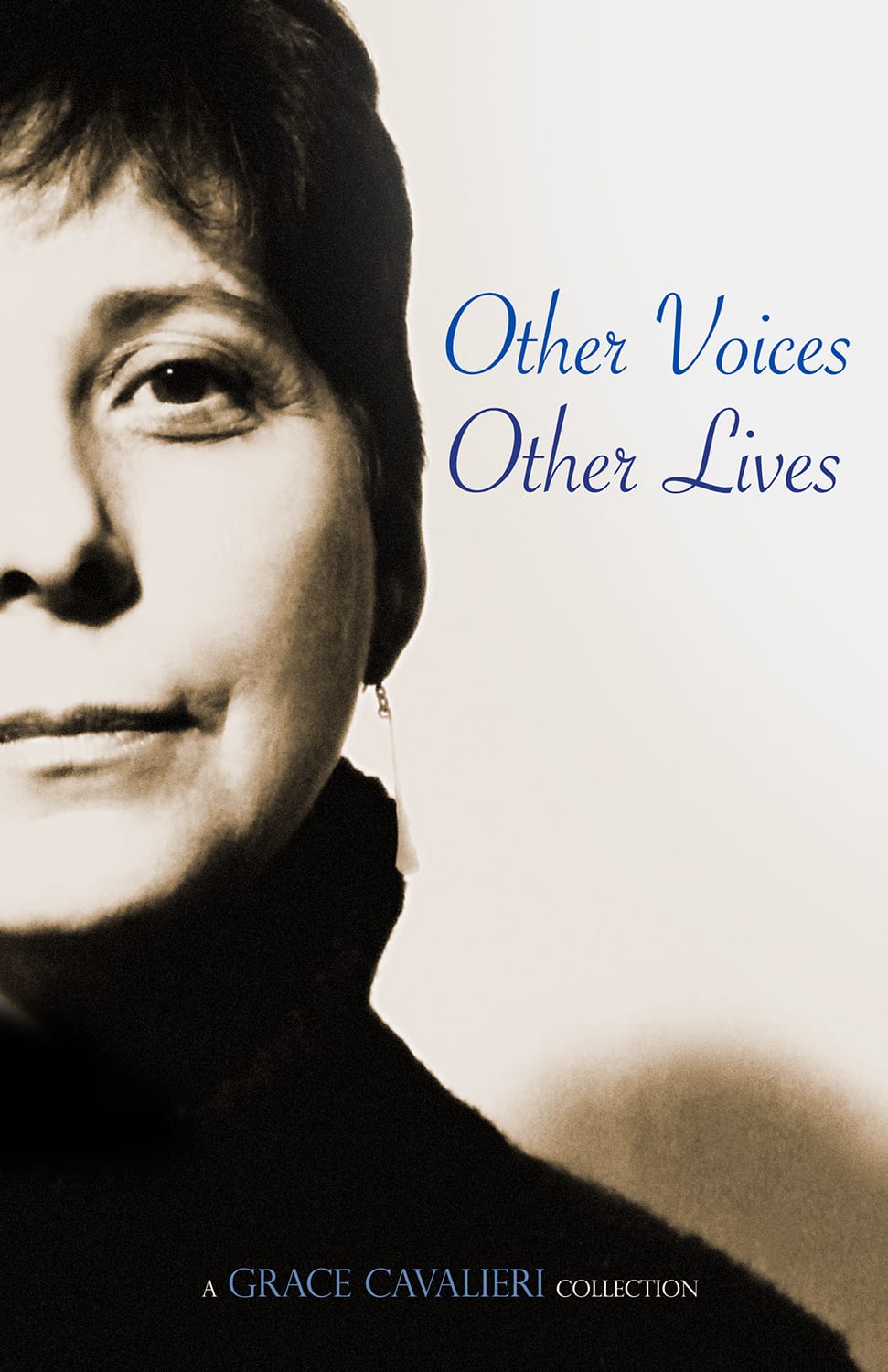"Poetry in Motion." An Introduction to Grace Cavalieri
Grace Cavalieri has been publishing poetry for over 50 years. But how did she get her start? In this weeklong series we will be discussing Grace's life and work in detail. Today, we discuss her origin as a poet.

Like many feminist writers of the midcentury, Grace Cavalieri’s artistic origin coincided with her husband’s deployment. It was the mid 1960s, Grace’s husband, airforce pilot, and, later, sculptor Kenneth Flynn, was deployed on shore duty in Annandale, Virginia and Grace, for the first time, found time on her hands. Even though Grace had four children (a grueling full-time job on its own) she found herself in a position where she had the time, freedom, and financial support to pursue whatever it would be she wanted. What she wanted, of course, was that thing that she would come to call a compulsion, an energy that, if held without outlet, would inevitably “burst.” She wanted, as you know, to write.
Kenneth was ever supportive of his young wife. A well-loved person whom poet, Rose Solari, says reminded her of Ambassador Taylor and whom Grace remained married with until his passing a few days shy of his eighty third birthday, it was on his suggestion that Grace started sending out her poems to major and minor publications. It is just like selling used cars, he told her. They only sell one of every eight.
But mailing poems and plays even then was costly, and, although she was caring for her four children, Grace had no source of income outside of Kenneth’s military stipend. So, the artist took it upon herself to fund her poetry habit. “I felt guilty spending money trying to mail my daily poems and plays out” Grace told the Little Patuxent Review, “I learned that the DC commission said it supported artists, so I wrote to them: I NEED SUPPORT.”
The DC arts commission invited Grace to tell her story in DC and, afterward, wrote her a check for $200. The year was 1966. With the money, says Grace, “I bought a maxi coat…I figured they’d certainly want me to look like an artist instead of a homemaker.” By the end of 1968, Grace had published 13 poems.
But, the woman who wrote, “Work is my Secret Lover” also wrote “I think Art is a dark horse we ride, and we have no choice, and we have to forgive ourselves for that.”
For Grace, poetry writing is not just some hobby, not just a means to a career or academic job, and certainly not a limited formal practice. For Grace, writing is a compulsion. “I didn’t have a choice” she told WAMU’s Mikaela Lefrak, “You do it because you have to say something or you will burst.” Grace is a poet of the work of writing and an adept at the synthesis of poetry and craft. Like every good poet of work, she prioritizes dreaming and is so doing all day long. In a word, Grace is always writing even when she is not sat down--she is like Frost’s famous apple picker listening dreamily to bushels of imaginary apples rumble into their barrels. But, such dreaminess can prove dissonant with a waking life that requires us be geared machine-like to the current moment.
In her memoir, Grace writes “If I was guilty of anything, it was sewing the light of poetry, and some days, leaving the children only the cloth.” Ann Bracken, in the Patuxent interview (the best extant written interview with Grace Cavalieri), wisely asks Grace Cavalieri to expand on the meaning of this.
Grace says “Even when I was physically in a room with my children if my mind was elsewhere, was I present? Even if this is only at times — if you are staring at the ceiling thinking of that last line, what must that be to a little girl waiting for your attention? Being present is something I came to, thankfully, not too late.”
And this discovery of presence is explained in the marvelous introduction to Grace’s compendium Other Voices, Other Lives where Rose Solari marvels at Grace’s almost uncanny ability to hold onto all the threads of her life and her work and still to dream
“What is most astonishing to me is how she finds time for so much outreach and nurturing in the midst of a busy career she’s built by hand. While many other poets of her stature have found perches at universities or foundations, Grace has carved out an independent path, guest teaching here and there, forging connections between diverse literary groups, launching off-Broadway plays. She’s a tireless reviewer of poetry, prose, and drama. And of course, there’s the radio show, which she prepares for meticulously every week. A constant refrain from those who have been interviewed by Grace—me included—is how deeply and thoroughly she has read their work. Her interview subjects range from poets laureate to as-yet-unknown writers, and she gives each the same warm, rapt attention.”
Tomorrow we will examine the many voices of Grace Cavalieri’s poetic work, her poems and plays examining the lives of Anna Nicole Smith, Mary Wollstonecraft, and Harriet Powers.

Other Voices, Other Lives: A Grace Cavalieri Collection is a selection of poems, plays, and interviews drawn from over forty years of work by one of America’s most beloved and influential women of letters. The author of 23 books of poetry and 26 produced plays, and the founder of the legendary radio interview program, The Poet and the Poem, Grace Cavalieri has won multiple national awards for her writing and her service to literature. She currently resides in Annapolis, Maryland.
In preparing this, the second ASP Legacy volume, the author has worked closely with the editor, hand-picking her most beloved poems, plays, and interviews for inclusion here. Her empathy, charm, and sophisticated wit are preserved and presented in this volume by way of ASP’s signature deckle edges and French folds, and by the included art of her late husband who drew a series of sketches he called “waiting for Grace.” It is bound, printed, and edited with the scrutiny demanded by a piece of art. In this way, Other Voices, Other Lives is an appropriate and necessary celebration of Cavalieri’s accomplishments, and a testimony to the power and range of her work.